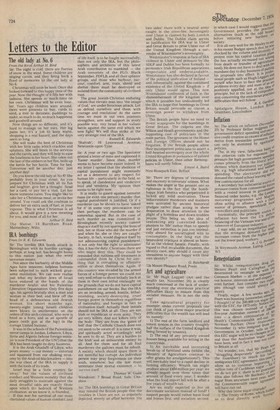Art and agriculture
Sir: Mr Hugh Leggatt (Art and the wealth tax, November 16) is clearly much concerned at the lack of understanding over the enormous practical difficulties likely to ensure from this socialist measure. He is not the only one!
Take agricultural property for example: under current proposals one can think of just three major practical difficulties that the wealth tax will lead to, namely: 1) The end of the farm landlord and tenant system in this country (roughly half the surface of the United Kingdom being farmed by tenants). 2) The end of any privately owned houses being available for letting in the countryside.
3), An inevitable and increasing break-up of farmland units (whilst the
Ministry of Agriculture continue to offer grants for amalgamations?). This will inevitably lead to a rapid decline in farming efficiency. Wealth tax might produce about £450 million per year: we already import over three times that amount of food every year. I wonder what the food import bill will be after a few years of wealth tax. • Are we really expected to live on doctrinaire socialism instead of food? I suspect people would rather have food and homes first, and socialism second:
in which case I would suggest that the s2tt:ovierentryan.omveesntfsporcohviadsesthetheoddprahcotaseica; before initiating new burdens on
o
It is all very well for Mr Healey to say in his recent Budget speech that he wasi shocked by the volume and intensity protest over his capital taxation Plans (he has actually increased tax anal from death or transfer of agricultura land). He does not have to deal with the his to effect. It of ppurtor is pro ifesn: sional people such as Hugh Leggatt dj myself who have to face the pled° problems every day: and most of us are,idea 0 pporisniodivpelely hauptpaatl Ifehdo, inacokt oa ft ctohme dsiioffniccooltniceesnithiantgwthilei follow-ous Praell tic Spitalgate House, Logn.cro.n
Grantham, Lincolnshire GaZedi:


































 Previous page
Previous page